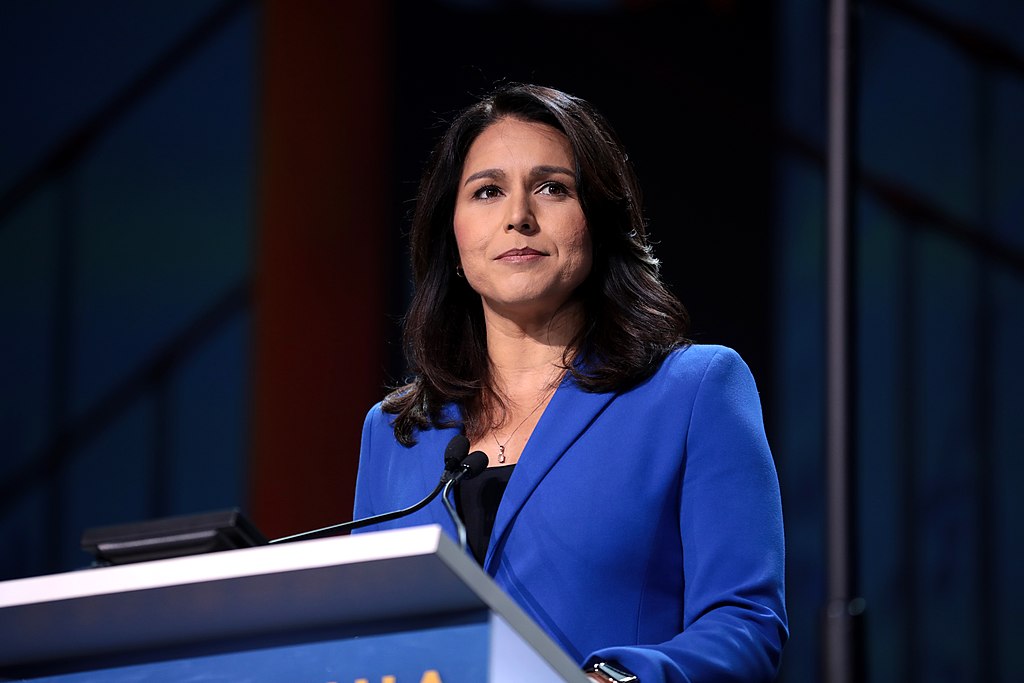President-elect Donald Trump has named former Democratic Congresswoman Tulsi Gabbard as the next Director of National Intelligence (DNI), overseeing the nation’s intelligence agencies. The appointment has sparked immediate reactions from both sides of the political spectrum, with supporters praising the choice as bold and unconventional. At the same time, critics argue that her views may be too radical for the critical role of safeguarding America’s intelligence.
Tulsi Gabbard, a former representative from Hawaii and an Iraq War veteran, rose to national prominence during her tenure in Congress as a vocal critic of U.S. interventionist foreign policy. Her nonconformist views, which often ran counter to the Democratic Party’s mainstream positions, gained her a following among anti-establishment voters and even earned her respect from Republicans, including Trump himself. In 2019, Gabbard ran a maverick campaign in the Democratic presidential primaries, appealing to voters dissatisfied with establishment politics and focusing on issues like ending "regime change wars."
Announcing her appointment, Trump expressed confidence in Gabbard’s ability to challenge the status quo within the intelligence community. “Tulsi is a fearless leader who speaks her mind. She’s exactly what we need to take on the entrenched bureaucracy in Washington,” Trump said in a statement. “She will bring a fresh perspective to our national security that’s long overdue.”
Praise and Controversy Surround the Pick
The decision has already ignited debate. Trump’s supporters have hailed the appointment as a refreshing break from the conventional picks for intelligence positions, many of whom come from within the intelligence or national security establishment. Gabbard’s appointment, they argue, could inject much-needed reform into an intelligence community that has been criticized for lack of transparency and alleged bias.
However, critics from both the Democratic and Republican parties are less enthusiastic. Many within the intelligence and national security sectors are wary of Gabbard’s non-interventionist views and her calls for de-escalation in U.S. relations with countries like Syria and Iran. Some have expressed concern that her stance could clash with traditional intelligence objectives, potentially weakening the U.S. posture against adversaries.
“Tulsi Gabbard as DNI is one of the most contentious moves we’ve seen,” said a senior intelligence official on the condition of anonymity. “The role requires a firm commitment to American interests on the global stage, and there are concerns about whether her policies align with the traditional priorities of the intelligence community.”
Gabbard’s Vision for National Intelligence
In response to the news, Gabbard emphasized her commitment to serving the American people and ensuring that the intelligence community acts with integrity and in alignment with U.S. interests.
Gabbard has previously called for significant reform within U.S. intelligence agencies, criticizing what she describes as “politicization” and “overreach” within parts of the intelligence community. Supporters say her willingness to challenge orthodoxy is exactly what the country needs, particularly in an era of rising tensions and complex global threats.
Looking Ahead
With her confirmation process likely to face intense scrutiny, it remains to be seen whether Gabbard can rally enough support to secure the position. Many in Congress are already preparing to question her views on foreign policy and national security, which they fear may disrupt U.S. intelligence operations.



 Trump Launches Operation Epic Fury: U.S. Strikes on Iran Mark High-Risk Shift in Middle East
Trump Launches Operation Epic Fury: U.S. Strikes on Iran Mark High-Risk Shift in Middle East  Trump to Address Nation as U.S. Launches Strikes in Iran, Axios Reports
Trump to Address Nation as U.S. Launches Strikes in Iran, Axios Reports  Netanyahu Suggests Iran’s Supreme Leader Khamenei May Have Been Killed in Israeli-U.S. Strikes
Netanyahu Suggests Iran’s Supreme Leader Khamenei May Have Been Killed in Israeli-U.S. Strikes  HHS Adds New Members to Vaccine Advisory Panel Amid Legal and Market Uncertainty
HHS Adds New Members to Vaccine Advisory Panel Amid Legal and Market Uncertainty  Pentagon Leaders Monitor U.S. Iran Operation from Mar-a-Lago
Pentagon Leaders Monitor U.S. Iran Operation from Mar-a-Lago  Iran Supreme Leader Ayatollah Ali Khamenei Killed in Israeli, U.S. Strikes: Reuters
Iran Supreme Leader Ayatollah Ali Khamenei Killed in Israeli, U.S. Strikes: Reuters  Trump Says U.S. Attacks on Iran Will Continue, Warns of More American Casualties
Trump Says U.S. Attacks on Iran Will Continue, Warns of More American Casualties  Trump Announces U.S. Strikes on Iran Navy as Conflict Escalates
Trump Announces U.S. Strikes on Iran Navy as Conflict Escalates  Australia Rules Out Military Involvement in Iran Conflict as Middle East Tensions Escalate
Australia Rules Out Military Involvement in Iran Conflict as Middle East Tensions Escalate  Middle East Conflict Escalates After Khamenei’s Death as U.S., Israel and Iran Exchange Strikes
Middle East Conflict Escalates After Khamenei’s Death as U.S., Israel and Iran Exchange Strikes  Trump Floats “Friendly Takeover” of Cuba as Rubio Reportedly Engages in Talks
Trump Floats “Friendly Takeover” of Cuba as Rubio Reportedly Engages in Talks  U.S. Lawmakers Question Trump’s Iran Strategy After Joint U.S.-Israeli Strikes
U.S. Lawmakers Question Trump’s Iran Strategy After Joint U.S.-Israeli Strikes  Israel Declares State of Emergency as Iran Launches Missile Attacks
Israel Declares State of Emergency as Iran Launches Missile Attacks  Israel Launches Fresh Strikes on Iran After Death of Supreme Leader Ayatollah Khamenei
Israel Launches Fresh Strikes on Iran After Death of Supreme Leader Ayatollah Khamenei  U.S. Deploys Tomahawks, B-2 Bombers, F-35 Jets and AI Tools in Operation Epic Fury Against Iran
U.S. Deploys Tomahawks, B-2 Bombers, F-35 Jets and AI Tools in Operation Epic Fury Against Iran  Australian PM Calls Alleged Western Australia Terror Plot “Deeply Shocking” After Arrest
Australian PM Calls Alleged Western Australia Terror Plot “Deeply Shocking” After Arrest  Israel Strikes Hezbollah Targets in Lebanon After Missile and Drone Attacks
Israel Strikes Hezbollah Targets in Lebanon After Missile and Drone Attacks 
































